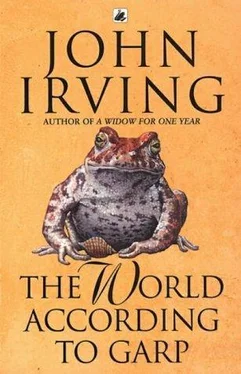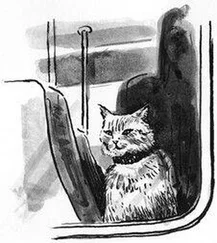The javelin throwers at Steering practiced behind the football stadium, where they spent much of their time spearing frogs. The upper, freshwater reaches of the Steering River ran behind Seabrook Stadium; many javelins were lost there, and many frogs were slain. Spring is no good, thought Garp, who was restless, who missed wrestling; if he couldn't have wrestling, at least let the summer come, he thought, and he would run long-distance on the road to the beach at Dog's Head Harbor.
One day, in the top row of empty Seabrook Stadium, he saw Helen Holm alone with a book. He climbed up the stadium stairs to her, clicking his javelin against the cement so that she wouldn't be startled by seeing him so suddenly beside her. She wasn't startled. She had been watching him and the other javelin throwers for weeks.
“Killed enough little animals for today?” Helen asked him. “Hunting something else?”
“From the very beginning,” Garp wrote, “Helen knew how to get the words in.”
“With all the reading you do, I think you're going to be a writer,” Garp told Helen; he was trying to be casual, but he guiltily hid the point of his javelin with his foot.
“No chance,” Helen said. She had no doubt about it.
“Well, maybe you'll marry a writer,” Garp said to her. She looked up at him, her face very serious, her new prescription sunglasses better suited to her wide cheekbones than her last pair that always slid down her nose.
“If I marry anybody , I'll marry a writer,” Helen said. “But I doubt I'll marry anybody.”
Garp had been trying to joke; Helen's seriousness made him nervous. He said, “Well, I'm sure you won't marry a wrestler .”
“You can be very sure,” Helen said. Perhaps young Garp could not conceal his pain, because Helen added, “Unless it's a wrestler who's also a writer.”
“But a writer first and foremost,” Garp guessed.
“Yes, a real writer,” Helen said, mysteriously—but ready to define what she meant by that. Garp didn't dare ask her. He let her go back to her book.
It was a long walk down the stadium stairs, dragging his javelin behind him. Will she ever wear anything but that gray sweat suit? he wondered. Garp wrote later that he first discovered he had an imagination while trying to imagine Helen Holm's body. “With her always in that damn sweat suit,” he wrote, “I had to imagine her body; there was no other way to see it.” Garp imagined that Helen had a very good body—and nowhere in his writing does he say he was disappointed when he finally saw the real thing.
It was that afternoon in the empty stadium, with frog gore on the point of his javelin, when Helen Holm provoked his imagination and T. S. Garp decided he was going to be a writer. A real writer, as Helen had said.
T. S. GARP wrote a short story every month he was at Steering, from the end of his freshman year until his graduation, but it wasn't until his junior year that he showed anything he wrote to Helen. After her first year as a spectator at Steering, Helen was sent to Talbot Academy for girls, and Garp saw her only on occasional weekends. She would sometimes attend the home wrestling meets. It was after one such match that Garp saw her and asked her to wait for him until he'd showered; he had something in his locker he wanted to give her.
“Oh boy,” Helen said. “Your old elbow pads?”
She didn't come to the wrestling room anymore, even if she was home from Talbot on a long vacation. She wore dark green knee socks and a gray flannel skirt, with pleats; often her sweater, always a dark and solid color, matched her knee socks, and always her long dark hair was up, twirled in a braid on top of her head, or complexly pinned. She had a wide mouth with very thin lips and she never wore lipstick. Garp knew that she always smelled nice, but he never touched her. He did not imagine that anyone did; she was as slender and nearly as tall as a young tree—she was taller than Garp by two inches or more—and she had sharp, almost painful-looking bones in her face, although her eyes behind her glasses were always soft and large, and a rich honey-brown.
“Your old wrestling shoes?” Helen asked him, inquiring of the large-sized, lumpy envelope that was sealed.
“It's something to read,” Garp said.
“I've got plenty to read,” Helen said.
“It's something I wrote,” Garp told her.
“Oh boy,” Helen said.
“You don't have to read it now,” Garp told her. “You can take it back to school and write me a letter.”
“I've got plenty to write,” Helen said. “I've got papers due all the time.”
“Then we can talk about it, later,” Garp said. “Are you going to be here for Easter?”
“Yes, but I have a date,” Helen said.
“Oh boy,” said Garp. But when be reached to take back his story, the knuckles of her long hand were very white and she would not let go of the package.
In the 133-pound class, his junior year, Garp finished the season with a won-lost record of 12-1, losing only in the finals of the New England championships. In his senior year, he would win everything—captain the team, be voted Most Valuable Wrestler, and take the New England title. His team would represent the beginning of an almost twenty-year dominance of New England wrestling by Ernie Holm's Steering teams. In this part of the country, Ernie had what he called an Iowa advantage. When Ernie was gone, Steering wrestling would go downhill. And perhaps because Garp was the first of many Steering stars, he was always special to Ernie Holm.
Helen couldn't have cared less. She was glad when her father's wrestlers won, because that made her father happy. But in Garp's senior year, when he captained the Steering team, Helen never attended a single match. She did return his story, though—in the mail from Talbot, with this letter.
Dear Garp,
This story shows promise, although I do think, at this point, you are more of a wrestler than a writer. There is a care taken with the language, and a feeling for people, but the situation seems rather contrived and the ending of this story is pretty juvenile. I do appreciate you showing it to me, though.
Yours,
Helen
There would be other rejection letters in Garp's writing career, of course, but none would mean as much to him as this one. Helen had actually been kind. The story Garp gave her was about two young lovers who are murdered in a cemetery by the girl's father, who thinks they are grave robbers. After this unfortunate error, the lovers are buried side by side; for some completely unknown reason, their graves are promptly robbed. It is not certain what becomes of the father—not to mention the grave robber.
Jenny told Garp that his first efforts at writing were rather unreal, but Garp was encouraged by his English teacher—the closest thing Steering had to a writer-in-residence, a frail man with a stutter whose name was Tinch. He had very bad breath, remindful to Garp of the dog breath of Bonkers—a closed room of dead geraniums. But what Tinch said, though odorous, was kind. He applauded Garp's imagination, and he taught Garp, once and for all, good old grammar and a love of exact language. Tinch was called Stench by the Steering boys of Garp's day, and messages were constantly left for him about his halitosis. Mouthwash deposited on his desk. Toothbrushes in the campus mail.
It was after one such message—a package of spearmint breath fresheners taped to the map of Literary England—that Tinch asked his composition class if they thought he had bad breath. The class sat as still as moss, but Tinch singled out young Garp, his favorite, his most trusted, and he asked him directly, “Would you say, Garp, that my b-b-breath was bad?”
Читать дальше












